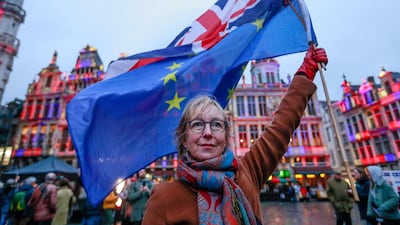UAE expatriates sending money home to Europe are currently receiving more euros for their dirhams, with the euro falling from about Dh4.6 to Dh4 over the past two years. They are effectively enjoying a pay rise in their own currency at a time when few private sector companies are increasing salaries.
At the same time the British pound has been recovering from its previous decline against the euro. Since last September the British currency is up from €1.07 to €1.19.
Compare sterling to the US dollar, however, and a recovery to $1.35 since December’s general election has stalled; it now stands at $1.32.
One message the currency market could be sending us is that it thinks the recovery of the British economy will be swift after its agonising three-and-a-half year wait for Brexit that eventually happened at the end of last week.
You could argue that currency markets are saying that the damage from Brexit to the European Union will be greater than it will be to Britain, although that would surely be accompanied by a more sustained rally in the pound versus the US dollar.
Currency markets are always difficult to interpret, and there is also a danger of reading too much into them. Something they do consistently reflect are the dynamics of interest rates and their outlook.
The European Central Bank cannot really lower interest rates any further. They are already at negative 0.5 per cent, and the ECB’s new President, Christine Lagarde has just ordered a strategic review.
The euro is now looking a little oversold and ready for a re-rating. From a contrarian perspective the euro is probably the place to go, longer term. Saving your highly-valued dirhams in currently lowly-valued euros might be a good plan.
Meanwhile, the Federal Reserve lowered its interest rates three times last year at the behest of US President Donald Trump. Yet they remain higher than in the UK or Asia, and so the dollar is currently king.
A Wall Street boom – with stocks up around 30 per cent last year – sucked in cash from far and wide, with a great deal of money flowing in from Europe and Brexit-battered Britain in the hunt for yield.
That gave the dollar a final hike. But last week US stocks fell sharply on fears of the spreading coronavirus and a dollar-weakening share correction could just be starting.
Hence you have a weak euro, a dollar riding for a fall, and a somewhat healthier pound now that the uncertainty surrounding the Brexit has been lifted or at least kicked down the road.
The British economy has a few green shoots. A £65 million (Dh315.11m) London house deal was finalised the day after the Conservative party won the election. House prices have bounced a little. My nephew who works in house extensions has never been busier.
A bit of flag-waving – or rather the removal of the Union Jack from the line-up of the 27 other EU member states last Friday – and some catchy initiatives to stop immigration and promote big public spending projects, might rally the pound for a short period now that the Brexit is done at last.
Yet, behind the scenes at the Bank of England the talk has been about when to lower interest rates to buck up the anaemic UK economy.
It would most likely have enjoyed a mini-boom over the past few years without the Brexit debacle. Remember that before the Brexit referendum, the pound stood above $1.50 versus $1.32 today. Brexit has already cost the country dearly.
Unless there is some sort of spontaneous economic boom post-Brexit – and it is hard to see any such dynamism emerging this week with markets traumatised by the coronavirus epidemic in China – then it is only a matter of time before the UK lowers its interest rates. That is not usually good news for pound sterling.
The Bank of England itself issued a warning about the dangers of the Brexit to the UK economy four years ago when it published a negative assessment.
You change the terms of trade on one half of your national exports – and we will not know what the new terms are until the end of this year at the earliest – and this will definitely have an economic impact. A deal with the US on the 20 per cent of trade it represents simply cannot compensate, even if a generous President Donald Trump decided not to put ‘America First’.
What is now billed as a ‘soft’ Brexit could well end up being a lot harder than optimistic British nationalists believe, and nobody has ever claimed that a ‘hard’ Brexit would mean anything except a weaker pound. Its current strength against the euro would then be fleeting too.
Buy the weak euro for a bargain, although all currencies will likely devalue against gold.
Peter Cooper has been writing about Gulf finance for two decades
















